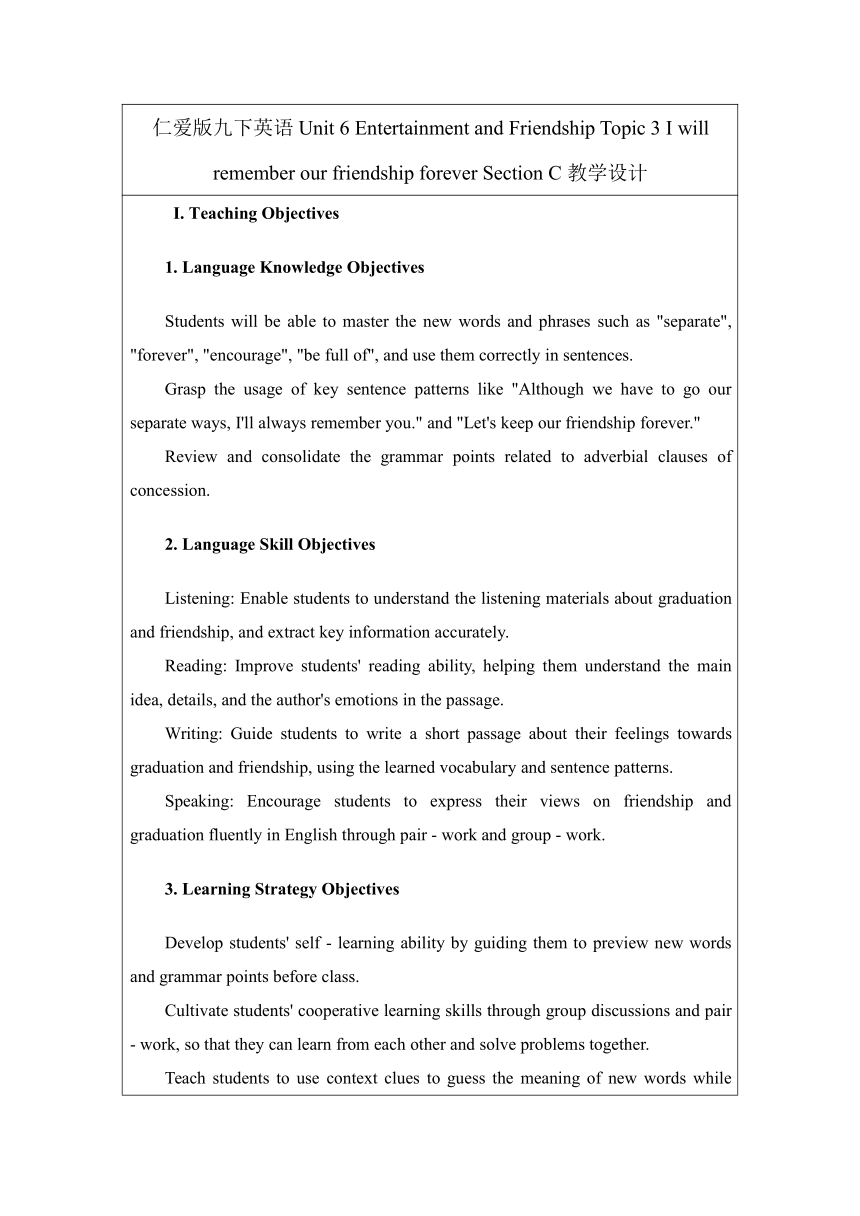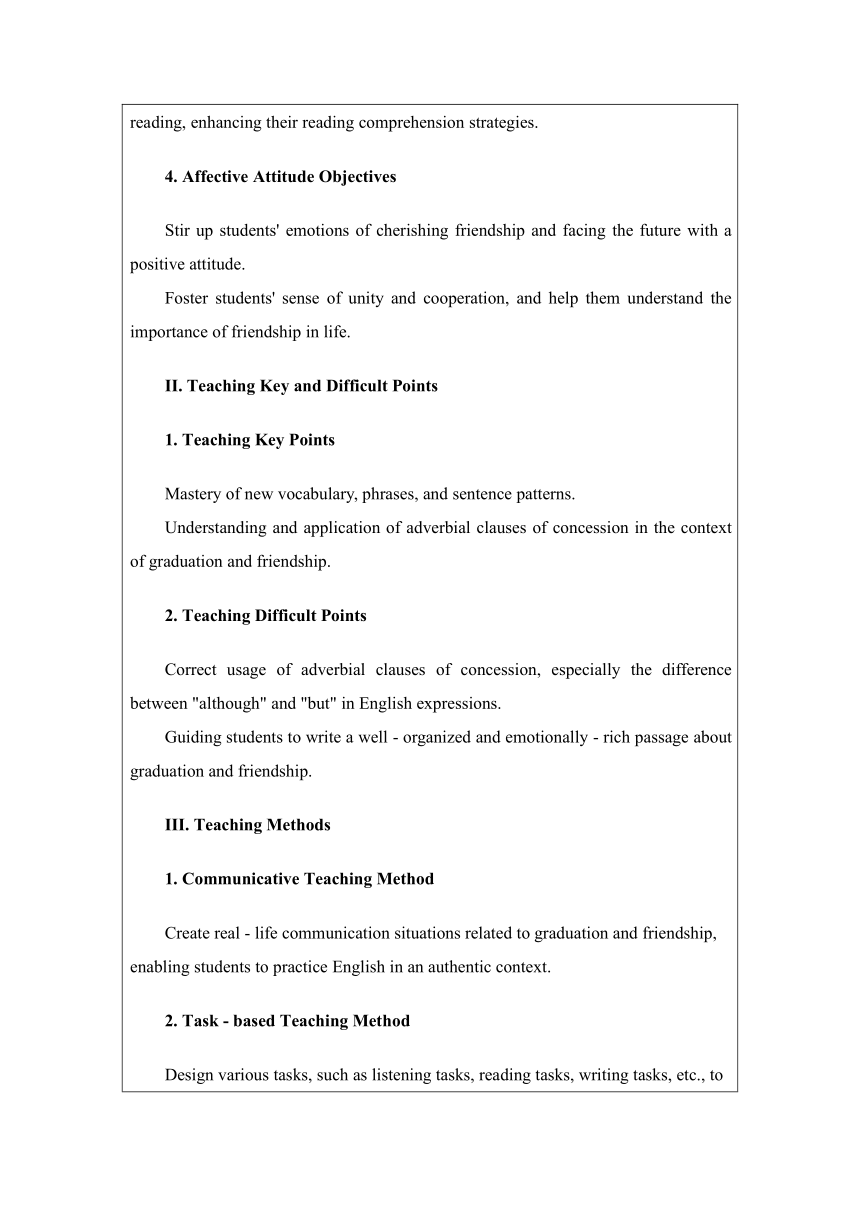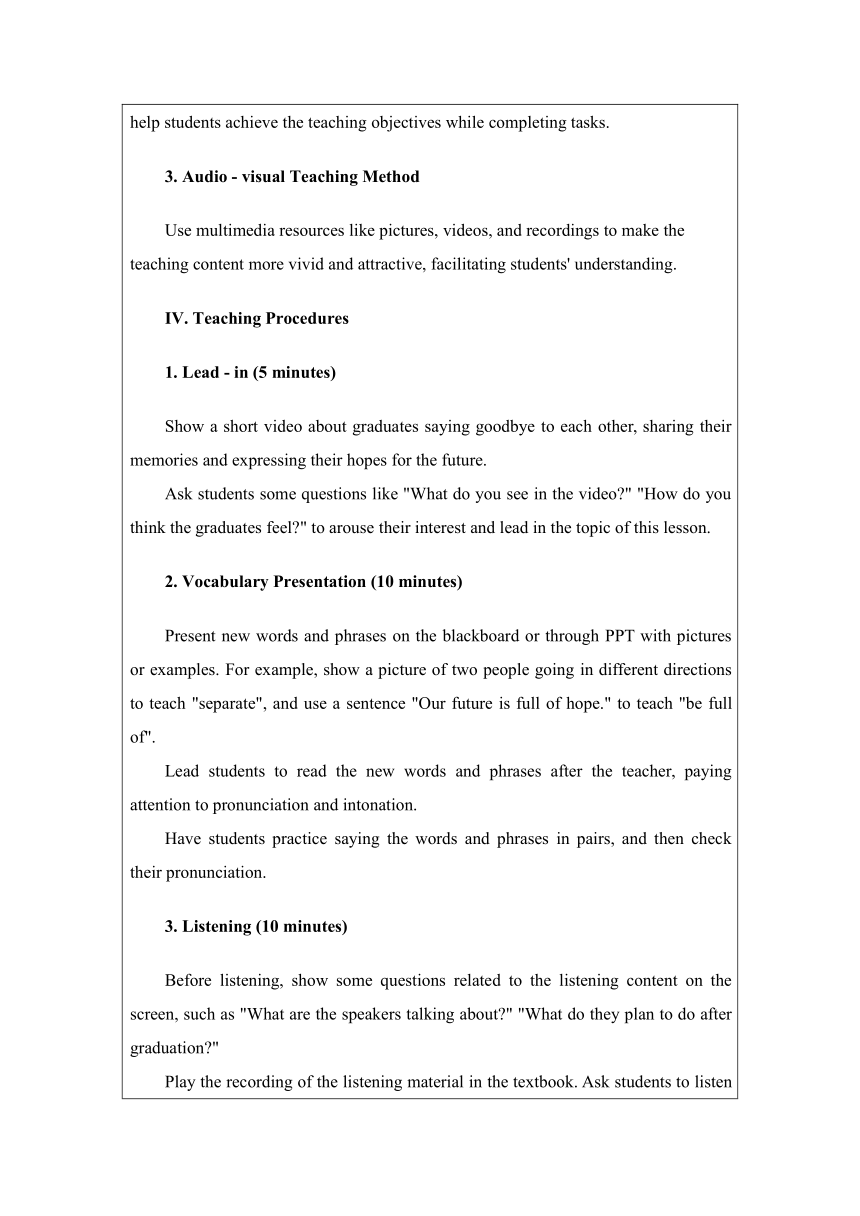仁爱版九年级下册英语Unit 6 Topic 3 I will remember our friendship forever.Section C 教学设计(表格式)
文档属性
| 名称 | 仁爱版九年级下册英语Unit 6 Topic 3 I will remember our friendship forever.Section C 教学设计(表格式) |  | |
| 格式 | doc | ||
| 文件大小 | 39.5KB | ||
| 资源类型 | 教案 | ||
| 版本资源 | 仁爱科普版 | ||
| 科目 | 英语 | ||
| 更新时间 | 2025-01-21 19:24:58 | ||
图片预览



文档简介
仁爱版九下英语Unit 6 Entertainment and Friendship Topic 3 I will remember our friendship forever Section C教学设计
I. Teaching Objectives1. Language Knowledge ObjectivesStudents will be able to master the new words and phrases such as "separate", "forever", "encourage", "be full of", and use them correctly in sentences.Grasp the usage of key sentence patterns like "Although we have to go our separate ways, I'll always remember you." and "Let's keep our friendship forever."Review and consolidate the grammar points related to adverbial clauses of concession.2. Language Skill ObjectivesListening: Enable students to understand the listening materials about graduation and friendship, and extract key information accurately.Reading: Improve students' reading ability, helping them understand the main idea, details, and the author's emotions in the passage.Writing: Guide students to write a short passage about their feelings towards graduation and friendship, using the learned vocabulary and sentence patterns.Speaking: Encourage students to express their views on friendship and graduation fluently in English through pair - work and group - work.3. Learning Strategy ObjectivesDevelop students' self - learning ability by guiding them to preview new words and grammar points before class.Cultivate students' cooperative learning skills through group discussions and pair - work, so that they can learn from each other and solve problems together.Teach students to use context clues to guess the meaning of new words while reading, enhancing their reading comprehension strategies.4. Affective Attitude ObjectivesStir up students' emotions of cherishing friendship and facing the future with a positive attitude.Foster students' sense of unity and cooperation, and help them understand the importance of friendship in life.II. Teaching Key and Difficult Points1. Teaching Key PointsMastery of new vocabulary, phrases, and sentence patterns.Understanding and application of adverbial clauses of concession in the context of graduation and friendship.2. Teaching Difficult PointsCorrect usage of adverbial clauses of concession, especially the difference between "although" and "but" in English expressions.Guiding students to write a well - organized and emotionally - rich passage about graduation and friendship.III. Teaching Methods1. Communicative Teaching MethodCreate real - life communication situations related to graduation and friendship, enabling students to practice English in an authentic context.2. Task - based Teaching MethodDesign various tasks, such as listening tasks, reading tasks, writing tasks, etc., to help students achieve the teaching objectives while completing tasks.3. Audio - visual Teaching MethodUse multimedia resources like pictures, videos, and recordings to make the teaching content more vivid and attractive, facilitating students' understanding.IV. Teaching Procedures1. Lead - in (5 minutes)Show a short video about graduates saying goodbye to each other, sharing their memories and expressing their hopes for the future.Ask students some questions like "What do you see in the video " "How do you think the graduates feel " to arouse their interest and lead in the topic of this lesson.2. Vocabulary Presentation (10 minutes)Present new words and phrases on the blackboard or through PPT with pictures or examples. For example, show a picture of two people going in different directions to teach "separate", and use a sentence "Our future is full of hope." to teach "be full of".Lead students to read the new words and phrases after the teacher, paying attention to pronunciation and intonation.Have students practice saying the words and phrases in pairs, and then check their pronunciation.3. Listening (10 minutes)Before listening, show some questions related to the listening content on the screen, such as "What are the speakers talking about " "What do they plan to do after graduation "Play the recording of the listening material in the textbook. Ask students to listen carefully and answer the questions.Play the recording again. This time, ask students to take notes of key information.Check the answers with the whole class and explain some difficult points in the listening material.4. Reading (10 minutes)Pre - readingShow a title - related picture or a short description related to the reading passage, and ask students to predict what the passage might be about.Present some words or phrases that may be difficult for students in the passage, and have a brief discussion about their possible meanings.While - readingHave students read the passage quickly to find the main idea. Ask them to summarize the main idea in one sentence.Then, let students read the passage carefully. During this reading, they need to answer some detailed questions, such as "Why do they cherish their friendship " "What do they hope for the future "Guide students to analyze the structure of the passage and find out the adverbial clauses of concession. Explain the grammar points in the context.Post - readingOrganize students to have a group discussion. The topic could be "What can we learn from the passage about friendship and graduation "Each group selects a representative to share their group's discussion results with the whole class.5. Writing (5 minutes)Give students some writing prompts, such as "Describe your feelings when you think about graduation.", "What do you want to say to your friends "Guide students to outline their writing, including the beginning, main body, and ending. Remind them to use the learned vocabulary, sentence patterns, and adverbial clauses of concession.Have students start writing. Walk around the classroom to offer help and guidance if necessary.6. Summary and Homework (5 minutes)SummaryInvite students to summarize what they have learned in this class, including new words, phrases, sentence patterns, grammar points, and the understanding of friendship and graduation.The teacher supplements and emphasizes the key points, and helps students form a clear knowledge system.HomeworkWritten homework: Ask students to complete their writing tasks, and make sure they use correct grammar and express their emotions clearly.Oral homework: Ask students to recite the key sentences in the passage and share their writing with their family members in English.V. Teaching ReflectionAfter teaching this lesson, it is necessary to reflect on whether students have achieved the four - dimensional teaching objectives. Pay attention to students' performance in class, especially their understanding of difficult grammar points and their ability to express their emotions in writing. Adjust teaching methods and content according to students' learning situations in future teaching. Consider adding more real - life examples and practice opportunities to enhance students' language application ability.
I. Teaching Objectives1. Language Knowledge ObjectivesStudents will be able to master the new words and phrases such as "separate", "forever", "encourage", "be full of", and use them correctly in sentences.Grasp the usage of key sentence patterns like "Although we have to go our separate ways, I'll always remember you." and "Let's keep our friendship forever."Review and consolidate the grammar points related to adverbial clauses of concession.2. Language Skill ObjectivesListening: Enable students to understand the listening materials about graduation and friendship, and extract key information accurately.Reading: Improve students' reading ability, helping them understand the main idea, details, and the author's emotions in the passage.Writing: Guide students to write a short passage about their feelings towards graduation and friendship, using the learned vocabulary and sentence patterns.Speaking: Encourage students to express their views on friendship and graduation fluently in English through pair - work and group - work.3. Learning Strategy ObjectivesDevelop students' self - learning ability by guiding them to preview new words and grammar points before class.Cultivate students' cooperative learning skills through group discussions and pair - work, so that they can learn from each other and solve problems together.Teach students to use context clues to guess the meaning of new words while reading, enhancing their reading comprehension strategies.4. Affective Attitude ObjectivesStir up students' emotions of cherishing friendship and facing the future with a positive attitude.Foster students' sense of unity and cooperation, and help them understand the importance of friendship in life.II. Teaching Key and Difficult Points1. Teaching Key PointsMastery of new vocabulary, phrases, and sentence patterns.Understanding and application of adverbial clauses of concession in the context of graduation and friendship.2. Teaching Difficult PointsCorrect usage of adverbial clauses of concession, especially the difference between "although" and "but" in English expressions.Guiding students to write a well - organized and emotionally - rich passage about graduation and friendship.III. Teaching Methods1. Communicative Teaching MethodCreate real - life communication situations related to graduation and friendship, enabling students to practice English in an authentic context.2. Task - based Teaching MethodDesign various tasks, such as listening tasks, reading tasks, writing tasks, etc., to help students achieve the teaching objectives while completing tasks.3. Audio - visual Teaching MethodUse multimedia resources like pictures, videos, and recordings to make the teaching content more vivid and attractive, facilitating students' understanding.IV. Teaching Procedures1. Lead - in (5 minutes)Show a short video about graduates saying goodbye to each other, sharing their memories and expressing their hopes for the future.Ask students some questions like "What do you see in the video " "How do you think the graduates feel " to arouse their interest and lead in the topic of this lesson.2. Vocabulary Presentation (10 minutes)Present new words and phrases on the blackboard or through PPT with pictures or examples. For example, show a picture of two people going in different directions to teach "separate", and use a sentence "Our future is full of hope." to teach "be full of".Lead students to read the new words and phrases after the teacher, paying attention to pronunciation and intonation.Have students practice saying the words and phrases in pairs, and then check their pronunciation.3. Listening (10 minutes)Before listening, show some questions related to the listening content on the screen, such as "What are the speakers talking about " "What do they plan to do after graduation "Play the recording of the listening material in the textbook. Ask students to listen carefully and answer the questions.Play the recording again. This time, ask students to take notes of key information.Check the answers with the whole class and explain some difficult points in the listening material.4. Reading (10 minutes)Pre - readingShow a title - related picture or a short description related to the reading passage, and ask students to predict what the passage might be about.Present some words or phrases that may be difficult for students in the passage, and have a brief discussion about their possible meanings.While - readingHave students read the passage quickly to find the main idea. Ask them to summarize the main idea in one sentence.Then, let students read the passage carefully. During this reading, they need to answer some detailed questions, such as "Why do they cherish their friendship " "What do they hope for the future "Guide students to analyze the structure of the passage and find out the adverbial clauses of concession. Explain the grammar points in the context.Post - readingOrganize students to have a group discussion. The topic could be "What can we learn from the passage about friendship and graduation "Each group selects a representative to share their group's discussion results with the whole class.5. Writing (5 minutes)Give students some writing prompts, such as "Describe your feelings when you think about graduation.", "What do you want to say to your friends "Guide students to outline their writing, including the beginning, main body, and ending. Remind them to use the learned vocabulary, sentence patterns, and adverbial clauses of concession.Have students start writing. Walk around the classroom to offer help and guidance if necessary.6. Summary and Homework (5 minutes)SummaryInvite students to summarize what they have learned in this class, including new words, phrases, sentence patterns, grammar points, and the understanding of friendship and graduation.The teacher supplements and emphasizes the key points, and helps students form a clear knowledge system.HomeworkWritten homework: Ask students to complete their writing tasks, and make sure they use correct grammar and express their emotions clearly.Oral homework: Ask students to recite the key sentences in the passage and share their writing with their family members in English.V. Teaching ReflectionAfter teaching this lesson, it is necessary to reflect on whether students have achieved the four - dimensional teaching objectives. Pay attention to students' performance in class, especially their understanding of difficult grammar points and their ability to express their emotions in writing. Adjust teaching methods and content according to students' learning situations in future teaching. Consider adding more real - life examples and practice opportunities to enhance students' language application ability.
同课章节目录
- Unit 5 China and the world
- Topic 1 China attracts millions of tourists from a
- Topic 2 He is really the pride of China.
- Topic 3 Now it is a symbol of England.
- Unit 6 Entertainment and Friendship.
- Topic 1 I would rather watch sports shows than tho
- Topic 2 Who is your favorite character in literatu
- Topic 3 I will remember our friendship forever.
